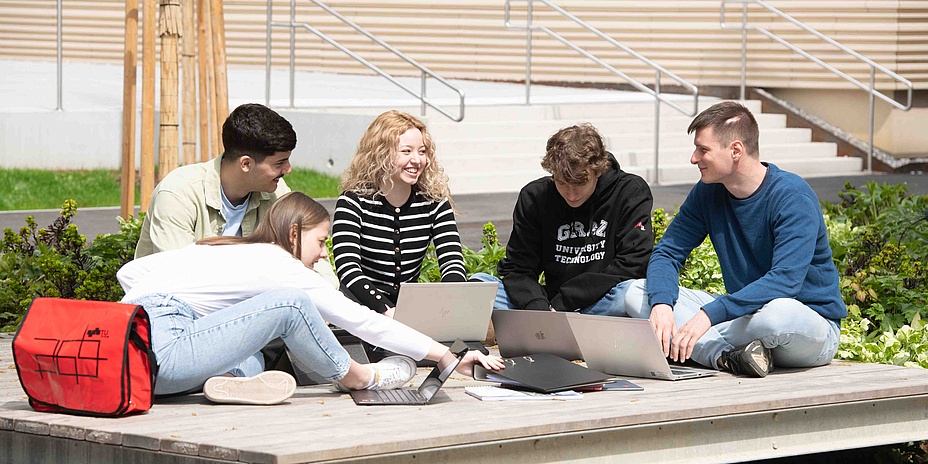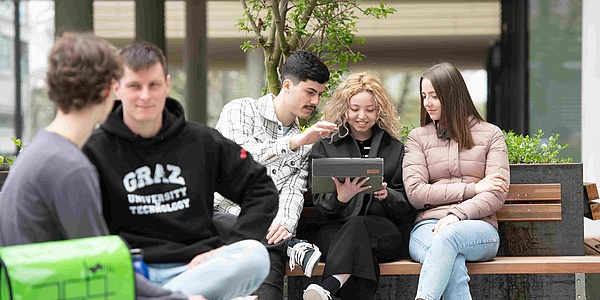Admission to TU Graz
First things first, the best place to start looking for information about applying as an international student would be the Admission of International Degree Programme Applicants website. If you have not yet gained admission to Graz University of Technology (TU Graz), please note that for some study programmes you have to undergo an admission procedure, which takes place once a year for the following academic year.
At the Admission of International Degree Programme Applicants website you will find information about the admission procedure, the different degree programmes and contact information of the registrar office.
Documents
What documents do I need for admission?
The two most important documents that you will require are the general qualification for university entrance – which usually corresponds to the final exam of your secondary school – the name of it may vary depending on which country you come from, and the proof of German or English language competence, depending on the language of instruction of your study programme.
If you decide to pursue a German study programme, you need to prove German language proficiency at level A2 or higher for admission. To enrol as a regular student, you must however reach level C1. In case you do not have a C1 level certificate in German yet, there is an option to apply for admission to a study programme, and then start your studies as an irregular student, where you are first sent to an institution called “OeAD Vorstudienlehrgang” to improve your German to the desired level (you are given 2 years, or in other words 4 semesters to achieve this – most people finish way before that). After you’ve finished, all you must do is bring this document to the university and you will be admitted as a regular student.
The website "Proof of German Language Competence" provides detailed information on language acquisition and the required language certification.
Do I need to translate my documents?
Yes, both your secondary school leaving examination certificate and the C1 German certificate have to be translated into German. Here I would recommend that you find a certified translator in your home country early enough to avoid time issues. I should also mention that having documents translated can sometimes be expensive – just so that you don’t get a shock if it’s the first time that you are doing this. Documents of some countries need to be additionally certified.
The “Translation and Certification of Documents” website provides further information on the process that documents of your country have to undergo in terms of translation and/or certification.
Welcome Center and International Welcome Days
Each year the Welcome Center of TU Graz organises the so called “International Welcome Days” which normally take place in the middle of September before the new academic year starts. At this event you can find very useful information and ask as many questions as you want. There you will be surrounded by people willing to help you with whatever your questions/queries may be. You will also go through a general presentation with other students that may or may not applied for the same study programme as you. It is the perfect place to make friends before the start of the semester and resolve any open questions.

Organisation
Once you have gained admission and all is set, the most important thing you should be thinking about is – yes, you guessed it – organisation! Being organised is something that plays an essential role not only at the very start of your studies, but also throughout your whole degree. Many studies show that people who organise themselves well tend to do better at university – and that´s not just coincidence.
In his blog post “Graduate Successfully with these Nine Tips” my colleague Ekrem Toroman writes about goals, mindset and time management that help you study successfully.
Another thing worth noting is that you´re not alone in this, there are many others who feel just as lost and overwhelmed as you are. You should know that it´s something completely normal and you’re not an exception.
Back to the actual topic! Let´s say the semester is starting in a couple of weeks, you still don´t know how to prepare yourself for it and you´re just looking for some advice – this is where I come into play. My first suggestion is that you have a look at your degree´s curriculum in the Information management system TUGRAZonline (as soon as you have your account and password) and find out as much information about your study programme as possible. This will allow you to get a brief overview of how it is organised and what there is to expect. You will find information such as names of institutes and teaching staff that are going to be teaching your particular courses, how all the subjects are distributed over the semesters, the degree of difficulty of each of those subjects (the ECTS system, where you are given a number of points or “credits” after passing an exam – the more difficult an exam, the more points you get for passing it, even though that´s not always the case and should be only considered as a rule of thumb).
Online platforms and taking notes
The second thing you should do is get familiar with the different online platforms that you are going to be using every day, such as:
- Teach Center (here you will find the study material for each of your subjects).
- TUbe (a platform of recorded lectures – very useful if you´re having a hard time catching everything the lecturer said in your course)
- Studo (which is not an actual platform but a mobile app that each student uses for seeing their schedule, receiving important emails from teaching staff, and discussing and chatting with other students about things you’re not sure about regarding specific subjects.)
Regarding taking notes: make them clear, readable and comprehensible! I would strongly recommend that you use a tablet and take notes with a (stylus) pen – this way you will be much faster and more flexible sharing and receiving notes with/from your friends – for instance via AirDrop. Different brands of tablets for note taking work just fine for this purpose.
Get to know your surroundings
Graz University of Technology (TU Graz) has three main campuses:
- Campus Alte Technik (near Rechbauerstraße 12, 8010 Graz)
- Campus Neue Technik (near Stremayrgasse 9, 8010 Graz)
- Campus Inffeldgasse (near Inffeldgasse, 8010 Graz)
Depending on the choice of study programme, you are going to spend more time at one campus than another. My advice would be to go and check out the campuses before you start your studies. This way it won’t be such a problem to find your way around on the 1st October or whenever you start your semester, and all in all it won´t be such a big surprise for you because you’ll already be familiar with the respective area.
If you want to find out more about the campuses of TU Graz or spots to study on campus, feel free to take a look into the following two blog posts of my colleague Sara: Places to network and study at TU Graz as well as Student and campus life at TU Graz.
University is teamwork
The sooner you realise this, the better. You won´t believe how much easier you can make your study life for yourself if you study in groups instead of alone. I can speak here from experience because I was one of those students who tended to study by themselves and it didn´t work out “perfectly” for me. I lost a lot of valuable time at the start, trying to figure out stuff on my own instead of just asking a friend for a simple summary. But like everything else, this also has advantages and disadvantages. My tendency to work things out for myself has made me very knowledgeable in some specific subjects/fields of my studies, and is also the reason why I also work as a student assistant at the Institute of Mechanics.

Remember to have fun
The next couple of years are going to be some of the best years of your life and you will never forget them. University is a place where you will make lifelong friends perhaps even a love interest or two. Of course, there will be homework, essays, deadlines, and exams – lots of exams, but you shouldn´t give up everything else in your life since these other things will keep your life balanced, healthy and stable. Do some sports with your friends, find some interesting hobbies for yourself, or go to a party every now and then, but most importantly do not forget to also have fun with everything at the university. At the end of the day, you chose something that you´re passionate about, so finding joy in that shouldn’t be too big of a deal.
Events
There are multiple events and festivals throughout the academic year that you can attend for free. Especially in the summer, different departments are constantly organising so-called “Spritzer stands” or underground parties directly on one of the campuses mentioned before. The Welcome Center of TU Graz also organises lots of events and activities for international students in and around Graz, such as city tours, hikes, game nights and even day trips. But also outside of the university area there are numerous festivals and parties which may awake your interest.a

If you have already gained admission to TU Graz, sign up for the Welcome Center mailing list to receive further information on events and activities organised for international students.
A quick summary of all the tips “in between the lines” that you should keep in mind while starting your university journey:
- For every minute spent organizing, an hour is gained.
- Be curious and explore.
- Don´t be afraid to ask questions.
- Start using a tablet for your notes – you´re going to thank me later!
- Knowledge and information equal power.
- Teamwork makes the dream work.
- Find a routine and adjust it later.
Two additional tips I can give are:
- Always be one step ahead of everyone else.
- Accept the fact that life is not a straight line, that there will be ups and downs, but what separates success from failure is how you deal with the downs.
![[Translate to Englisch:] [Translate to Englisch:]](https://www.tugraz.at/fileadmin/_processed_/0/e/csm_international-students-by-lunghammer-tugraz_db9450af13.jpg)





